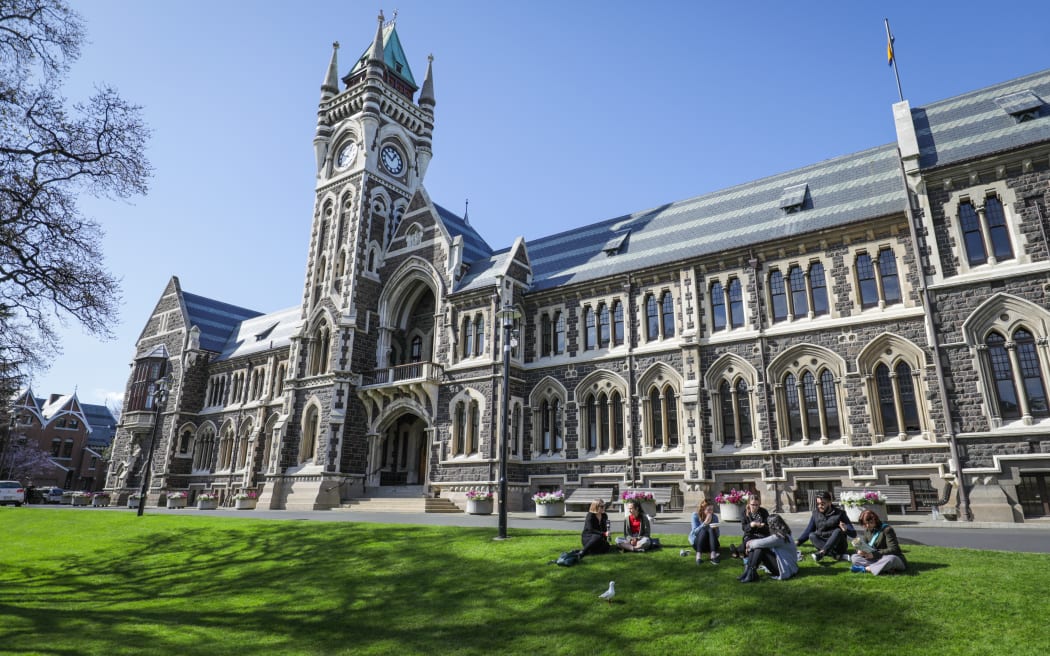
Photo: RNZ / Nate McKinnon
Otago University has no financial resilience and could not weather a fluctuation in enrolments, Tertiary Education Union kaiwhakahaere, and organiser at Otago University Phil Edwards says.
The university says several hundred staff could be laid off because of falling enrolments and the need for budget cuts of about $60 million.
"The funding model that supports the tertiary sector is broken," Edwards told Morning Report.
Members of the union got the information at a staff forum held on Thursday, Edwards said.
"Our members were extremely shocked.
"We realise there will be dips in student enrolments as a result of high unemployment and other factors but the problem is, the university is going into hundreds and hundreds of redundancies because they just don't have any financial resilience."
The problem was with budgeted student enrolments, he said.
Other problems included an aging stock of buildings, some with earthquake issues, he said.
"Whether it's financial mismanagement or poor decision making that's occurred over successive regimes, I guess that would be up to the university to provide the evidence for."
The staff cuts were not just in Dunedin and would not only impact academic staff, he said.
"We're going to see people that are losing their jobs at a time which is extremely challenging financially for everybody and if you're an academic or you're a specialised general staff member in tertiary education, there is no where else to go," he said.
"We're going to see a gutting of certain courses and programmes, potentially programmes disapearing completely."
Otago University acting vice-chancellor Helen Nicholson said a number of factors, not just falling student enrolments, led to the proposal to cut staff.
"On balance our 2023 forecast was reasonably accurate but there were a few assumptions that weren't quite what we forecast and one of those was around the number of students who passed university entrance...the other was the retention of our existing students."
She called it untenable and said it would have far reaching impacts across the entire university.
Nicholson said there were still details to be ironed out.
If there were not enough voluntary redundancies there would still need to be redundancies, she said.
Otago University Students Association president Quintin Jane said the government had a responsibility to look at the way universities were funded.
"Universities have taken a brunt of the Covid pandemic, they have had huge enrolment losses from international students that have really effected budgets and the government need to relook at the way we're funding the tertiary sector to make sure that it is still sustainable as we come out of the pandemic."
The cuts would impact the quality of the education students receive, he said.
"It's not just enrolments down, I think it's the wider Covid impact on the university space.
"Enrolments are down but employment is up so students are not looking to go to university where they're going to take on $60,000 debt and live in pretty poor conditions for three years when you can get a salary and no debt straight out of high school instead."
There may be more of an incentive for students to go to university if support schemes were reassessed, he said.
"It's also beyond just the allowance and loan scheme, we need to look at other ways we support students because housing quality for students in Dunedin is poor whereas if you work and you can live further from the university, you're more likely to get nice accommodation and better value for money."
Universities New Zealand executive director Chris Whelan said the university sector had been facing financial difficulties for last three or four years, partly because of Covid but due to a drop in government funding levels.
All eight universities were dealing with challenges in terms of making their books balance but the financial situation was worse for some than in others, he said.
Five had seen a drop in student numbers this year and all were rebuilding their international student numbers, he said.





